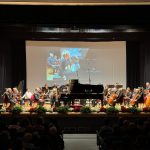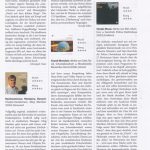INTERNATIONAL PIANO
March/April 2004
Sauer
Suite Moderne
Aus Lichten Tagen
3 Concert Etudes
Oleg Marshev (piano)
Danacord DACOCD595
Russian pianist Oleg Marshev is unstinting in his devotion on the works of the German born pianist Emil von Sauer (1862 – 1942). So far, Danacord has issued five volumes in its series (N/D 2001); another volume waits in the wings to introduce us to the composer’s Second Piano Concerto. For those unfamiliar with the compositions of this Golden Age musician, suffice it to say that they are highly virtuosic, not unlike the works of Anton Rubinstein (he studied with brother Nicholas) and vary in quality, in depth, and in interest.
The Suite Moderne, dedicated to fellow virtuoso Giovanni Sgambati, is one of his best pieces. Its five movements begin with a finger – breaking “Prelude passione”, continues with a powerful “Air Lugubre” that lasts almost 10 minutes, followed by two lighter but creative pieces called “Scherzo grotesque” and “Gavotte”, and concluding with an interesting set of variations. Maria Eugenia Tapia, who has also recorded this suite (M/A 2001) must now defer to Marshev’s cleaner execution and more colorful playing.
The five miniatures constituting Aus Lichten Tagen (First Signs of Spring) make for pleasant listening; the longest – “At the Cradle” – is slightly over three minutes. There is a Schumannesque quality to some of the writing, along with recollections of pieces by MacDowell. Many may be beguiled as I have by the skill of the writing, the creative harmonic turns, and the charm of the music.
The Concert Etudes (different from the ones recorded previously) are typical of the encore pieces Sauer liked to perform at concerts. They are effective in their own way but do not venture far beyond the allure of the drawing room. This is certainly not the case of the Galop de Concert, which inhabits the same realm as Liszt’s first Mephisto Waltz. It is a thrilling, bravura composition that awes a great deal to his teacher. Although his studies with Liszt were confined to just two summers, Sauer gave little credit to the master, who he claims was too old to teach him much.
Sauer enthusiasts will want to own his terrific first piano concerto in its splendid incarnation as part of Hyperion’s Romantic Piano Concerto series (J/F 1996). Exploration of the other volumes in this series is recommended if you find the music appealing. Do start with this one.


